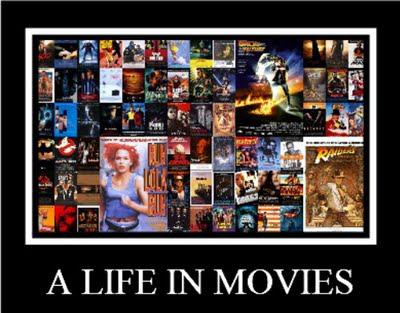
Here's my (overdue) contribution for Fandango Groovers' blogathon "A Life in Movies," in which bloggers choose their favorite films from each year since their birth. For the most part, I was surprised at how quickly I knew what my favorite film from each year was, but in some cases it was a struggle to decide. I also tried to limit directors to one film to avoid piling on too much life for any one person. For some of the more recent selections, you might see that I did not put the film that came no. 1 on my list for that year in the slot. This is not really because my mind changed but because of the aforementioned directorial limitation (also, as I note later, I've reevaluated my selection of year for movies like Certified Copy, which I probably should have considered a 2011 U.S. release despite managing to see it last year). Anyway, onto the picks:
1989 Batman
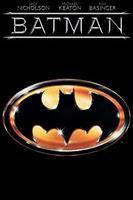 Not my favorite movie of 1989 by any stretch (Do the Right Thing and Sweetie are two of the best films I've ever seen), but this has the most resonance to my childhood. Born in the summer of Batman, it seems fated that I would have been such a Bat-freak as a child, and I must have worn scratches into our VHS. It had the camp of the mainstream Batman show but filtered it through Burton's then-fresh vision of Gothic pop-horror, making for a spooky, intricate Gotham where anything seemed possible. I have less love for Nicholson's performance now than I do for Keaton's understated but keen work, and Basinger and Wuhl are afterthoughts, but I can't help but love this thing.
Not my favorite movie of 1989 by any stretch (Do the Right Thing and Sweetie are two of the best films I've ever seen), but this has the most resonance to my childhood. Born in the summer of Batman, it seems fated that I would have been such a Bat-freak as a child, and I must have worn scratches into our VHS. It had the camp of the mainstream Batman show but filtered it through Burton's then-fresh vision of Gothic pop-horror, making for a spooky, intricate Gotham where anything seemed possible. I have less love for Nicholson's performance now than I do for Keaton's understated but keen work, and Basinger and Wuhl are afterthoughts, but I can't help but love this thing.1990 An Angel at My Table
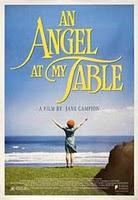 Jane Campion followed up on her striking feature debut with a three-hour biopic of New Zealand author Janet Frame. Campion's intuitive, gently surreal direction proved perfect for the story of a schizophrenic young woman paralyzed by insecurity and anthrophobia, though she never lets her direction outshine the narrative. This set the standard for Campion's other biographical films (The Piano, Bright Star), but she's yet to equal this astonishing (and all-too-sadly underseen) masterpiece.
Jane Campion followed up on her striking feature debut with a three-hour biopic of New Zealand author Janet Frame. Campion's intuitive, gently surreal direction proved perfect for the story of a schizophrenic young woman paralyzed by insecurity and anthrophobia, though she never lets her direction outshine the narrative. This set the standard for Campion's other biographical films (The Piano, Bright Star), but she's yet to equal this astonishing (and all-too-sadly underseen) masterpiece.1991 The Double Life of Véronique
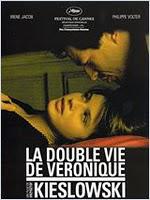 The preemptive fourth installment in Kiselowski's Three Colors trilogy, The Double Life of Veronique takes everything great about those three films and packs them into one bifurcated, curvilinear movie that constantly warps and bends until you'd swear you were watching the same five minutes over and over again. But those five minutes contain such density of thought, aesthetic and spirituality that you'll need the repetition to just begin parsing out everything. One of those movies that can truly change your life.
The preemptive fourth installment in Kiselowski's Three Colors trilogy, The Double Life of Veronique takes everything great about those three films and packs them into one bifurcated, curvilinear movie that constantly warps and bends until you'd swear you were watching the same five minutes over and over again. But those five minutes contain such density of thought, aesthetic and spirituality that you'll need the repetition to just begin parsing out everything. One of those movies that can truly change your life.1992 Bitter Moon
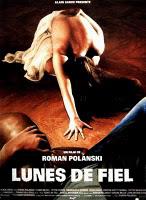 Roman Polanski's dark farce digs into sexual roles, sedentary relationships and the power and terror of fantasy as if ripped from the "Circe" chapter of Ulysses. Polanski deconstructs his earlier sex thrillers into their purest and scariest components, crafting a stylistic exercise so immaculate sometimes I forgot to scream because I was too busy soaking in the mise-en-scène. I don't know that there's a "point" to this movie, but as an experience of cinema, a madcap journey into the heart of technique and the ability of film to grip the throat, I'll take it over the whole of Gaspar Noé's canon.
Roman Polanski's dark farce digs into sexual roles, sedentary relationships and the power and terror of fantasy as if ripped from the "Circe" chapter of Ulysses. Polanski deconstructs his earlier sex thrillers into their purest and scariest components, crafting a stylistic exercise so immaculate sometimes I forgot to scream because I was too busy soaking in the mise-en-scène. I don't know that there's a "point" to this movie, but as an experience of cinema, a madcap journey into the heart of technique and the ability of film to grip the throat, I'll take it over the whole of Gaspar Noé's canon.1993 Carlito's Way
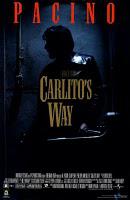 I cannot wait to revisit this movie after filling all these gaps in my De Palma's filmography. This film affected me profoundly when I saw it, and the more of De Palma's films I see, the more I think it is his grand summation as a filmmaker. A romantic, elegiac take on his outlandishly satiric Scarface, Carlito's Way, despite its modest scale and narrower focus, seems the mournful, disgusted conclusion The Godfather Part III was meant to be, a piteous attempt to wrench a broken, hollow man from the life that has taken everything from him but his last breath. In true De Palma fashion, the director lets us know up front that this, too, shall be taken before it's all said and done.
I cannot wait to revisit this movie after filling all these gaps in my De Palma's filmography. This film affected me profoundly when I saw it, and the more of De Palma's films I see, the more I think it is his grand summation as a filmmaker. A romantic, elegiac take on his outlandishly satiric Scarface, Carlito's Way, despite its modest scale and narrower focus, seems the mournful, disgusted conclusion The Godfather Part III was meant to be, a piteous attempt to wrench a broken, hollow man from the life that has taken everything from him but his last breath. In true De Palma fashion, the director lets us know up front that this, too, shall be taken before it's all said and done.1994 Chungking Express
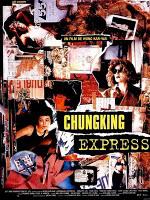 In the Mood For Love is Wong's best film but I can't help but return to this far more frequently. I would likely attribute that to the fact that Wong's magnum opus conveys the more acute, more experienced and deeper pain of loss in adulthood, while Chungking deals in the adolescent howls of unfamiliar agony that speaks more to where I'm at as a soon-to-be 22-year-old. Its diptych of confusion, sorrow and blindness to the potential of new love, Chungking Express can also be joyful, effervescent and playful in a manner unlike the more pained feel of Wong's other films. And if you don't smile with Faye Wong cleans the cop's apartment to her own cover of "Dreamlover," I pity you.
In the Mood For Love is Wong's best film but I can't help but return to this far more frequently. I would likely attribute that to the fact that Wong's magnum opus conveys the more acute, more experienced and deeper pain of loss in adulthood, while Chungking deals in the adolescent howls of unfamiliar agony that speaks more to where I'm at as a soon-to-be 22-year-old. Its diptych of confusion, sorrow and blindness to the potential of new love, Chungking Express can also be joyful, effervescent and playful in a manner unlike the more pained feel of Wong's other films. And if you don't smile with Faye Wong cleans the cop's apartment to her own cover of "Dreamlover," I pity you.1995 Safe
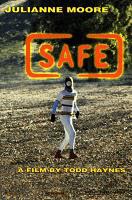 Todd Haynes' creepy, psychological horror film could address the rise of new, incurable strands of terrible disease, but it also tears down the increasing soullessness of our society. His Safe is a cartography of sterile postmodernism; everything in the frame looks as if it were rubbed down in bleach and hand sanitizer. But the cleaner it gets, the sicker bored yuppie Carol becomes, until we're left with the uncomfortable suggestion that the "safer" we make everything around us, the more vulnerable we become.
Todd Haynes' creepy, psychological horror film could address the rise of new, incurable strands of terrible disease, but it also tears down the increasing soullessness of our society. His Safe is a cartography of sterile postmodernism; everything in the frame looks as if it were rubbed down in bleach and hand sanitizer. But the cleaner it gets, the sicker bored yuppie Carol becomes, until we're left with the uncomfortable suggestion that the "safer" we make everything around us, the more vulnerable we become.1996 Dead Man
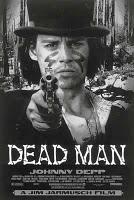 Though it premiered at the previous year's Cannes Film Festival, Jim Jarmusch's Dead Man didn't make its way back home until the following May. It's a wonder it got played at all: this is about as anti-America (or at least anti-American mythos) as a film can be. Whatever remained of the West after Peckinpah, Leone and Altman (with his McCabe & Mrs. Miller) got crushed under Jarmusch's boot heel here. This is a horrible fever vision of the Old West, a place where genocide and mass-scale environmental destruction were ways to relieve stress, where the theft of a horse can piss off a wealthy town dictator more than the death of his feckless son. As we follow our dying hero, named for the Romantic William Blake, we see the real Blake's flowery vision of the world undercut by brutality even as Jarmusch manages to find the spiritual strains cast aside in this hellish place. The greatest American film of the '90s.
Though it premiered at the previous year's Cannes Film Festival, Jim Jarmusch's Dead Man didn't make its way back home until the following May. It's a wonder it got played at all: this is about as anti-America (or at least anti-American mythos) as a film can be. Whatever remained of the West after Peckinpah, Leone and Altman (with his McCabe & Mrs. Miller) got crushed under Jarmusch's boot heel here. This is a horrible fever vision of the Old West, a place where genocide and mass-scale environmental destruction were ways to relieve stress, where the theft of a horse can piss off a wealthy town dictator more than the death of his feckless son. As we follow our dying hero, named for the Romantic William Blake, we see the real Blake's flowery vision of the world undercut by brutality even as Jarmusch manages to find the spiritual strains cast aside in this hellish place. The greatest American film of the '90s.1997 Chasing Amy
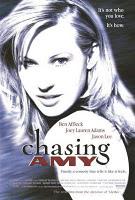 Kevin Smith's greatest film pulled back from the childish excess of Mallrats -- which, viewed from a certain angle, almost comes out a satire on Miramax's mercenary appropriation of independent and teenage values and perspectives -- and came out a beautifully realized portrait of the slacker in self-doubt. Smith never got nearly enough credit for actually digging into his characters instead of merely reveling in their Star Wars-quoting ennui (his Clerks II is one of the most underrated films of the '00s), and Chasing Amy remains his finest look into the anxieties and hangups that separate these people from others. Affleck and Adams will tear out your heart, and Jason Lee's acid tongue has never been so transparently a defense mechanism against his own fears. I cry every damn time.
Kevin Smith's greatest film pulled back from the childish excess of Mallrats -- which, viewed from a certain angle, almost comes out a satire on Miramax's mercenary appropriation of independent and teenage values and perspectives -- and came out a beautifully realized portrait of the slacker in self-doubt. Smith never got nearly enough credit for actually digging into his characters instead of merely reveling in their Star Wars-quoting ennui (his Clerks II is one of the most underrated films of the '00s), and Chasing Amy remains his finest look into the anxieties and hangups that separate these people from others. Affleck and Adams will tear out your heart, and Jason Lee's acid tongue has never been so transparently a defense mechanism against his own fears. I cry every damn time.1998 The Thin Red Line
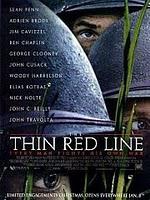 I'm becoming increasingly convinced that The New World is Malick's finest achievement to date, but I've not revisited it in some time and I find myself drawn to The Thin Red Line with incredible frequency. It does the impossible: make a poetic war film that does not poeticize the horror of war. Its poetics instead turn to the natural world being ripped apart by bullet, mortar and fire, putting the sense of waste in suitably blunt and final terms while seeking the spiritual thread that can overcome the violence around the characters. Malick may only make a movie once in a blue moon, but he makes one only when he has something to say. Maybe that's why each one is better than the last.
I'm becoming increasingly convinced that The New World is Malick's finest achievement to date, but I've not revisited it in some time and I find myself drawn to The Thin Red Line with incredible frequency. It does the impossible: make a poetic war film that does not poeticize the horror of war. Its poetics instead turn to the natural world being ripped apart by bullet, mortar and fire, putting the sense of waste in suitably blunt and final terms while seeking the spiritual thread that can overcome the violence around the characters. Malick may only make a movie once in a blue moon, but he makes one only when he has something to say. Maybe that's why each one is better than the last.1999 Bringing Out the Dead
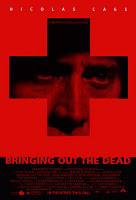 A stupendous year for cinema, yet I think my favorite movie from that year is one of its most underappreciated. Martin Scorsese's Bringing Out the Dead is the meeting of Taxi Driver's urgency and sense of helplessness and After Hour's stylistic farce, a humanistic dive into a master's technique that finds an unlikely harmony in its haphazard construction. Nicolas Cage has rarely been finer, and his insomniac visions of a New York in the death throes of its pre-Giuliani squalor say as much about the evolution, devolution and stagnation of elements of the city and its inhabitants as Gangs of New York.
A stupendous year for cinema, yet I think my favorite movie from that year is one of its most underappreciated. Martin Scorsese's Bringing Out the Dead is the meeting of Taxi Driver's urgency and sense of helplessness and After Hour's stylistic farce, a humanistic dive into a master's technique that finds an unlikely harmony in its haphazard construction. Nicolas Cage has rarely been finer, and his insomniac visions of a New York in the death throes of its pre-Giuliani squalor say as much about the evolution, devolution and stagnation of elements of the city and its inhabitants as Gangs of New York.2000 Yi Yi
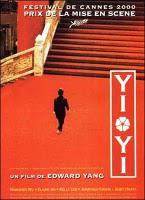 Seems to capture the world in three hours. Starting with a wedding and ending at a funeral, Yi Yi follows the path of life through all its ups and downs, capturing humor and incomprehensible loss. I haven't seen the film for some time but I can't get some moments out of my head, chief of which being that stark reveal of an old lover to the father who's back faces the audience, making his face unreadable. It doesn't matter: you can see right through to the pain on the other side, and that transparency of human emotion characterizes the film's purity.
Seems to capture the world in three hours. Starting with a wedding and ending at a funeral, Yi Yi follows the path of life through all its ups and downs, capturing humor and incomprehensible loss. I haven't seen the film for some time but I can't get some moments out of my head, chief of which being that stark reveal of an old lover to the father who's back faces the audience, making his face unreadable. It doesn't matter: you can see right through to the pain on the other side, and that transparency of human emotion characterizes the film's purity.2001 A.I. Artificial Intelligence
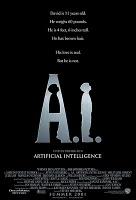 Jaws is the earliest non-kiddie movie I can recall seeing (I can recall it because it haunts me to this day), but I can no longer deny that Spielberg's two most misunderstood films (the other being Empire of the Sun) are his high-water marks. A.I. is big, bold and, many cases, unsubtle. But is also has a grace and humanism on a more intimate scale despite the bombast of its staging. For Spielberg, king of the mainstream, to make a film that essentially disproves the notion that humanity has any defining trait that separates us from the other animals (or our own creations) is unbelievable, and maybe that's why so few saw what he was doing. I see something new, something more downbeat, something more philosophically haunting with each viewing.
Jaws is the earliest non-kiddie movie I can recall seeing (I can recall it because it haunts me to this day), but I can no longer deny that Spielberg's two most misunderstood films (the other being Empire of the Sun) are his high-water marks. A.I. is big, bold and, many cases, unsubtle. But is also has a grace and humanism on a more intimate scale despite the bombast of its staging. For Spielberg, king of the mainstream, to make a film that essentially disproves the notion that humanity has any defining trait that separates us from the other animals (or our own creations) is unbelievable, and maybe that's why so few saw what he was doing. I see something new, something more downbeat, something more philosophically haunting with each viewing.2002 25th Hour
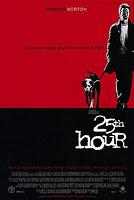 Spike Lee is an all-or-nothing filmmaker, and when he connects, his brash and confrontational style reveals the sadness and care beneath his polemics. 25th Hour could have been a disaster of finger-pointing, its tale of a two-bit crook going away for a long time against the backdrop of Ground Zero ripe for cheap moralizing. Instead, Lee sets Monty on an evolutionary path that expunges the hate, anger and anguish of the city's (and nation's) pain to glory in all that is left, the melting pot still churning and the solidarity stronger than it ever was. Not four years later, Lee would film the impact of Hurricane Katrina with uncompromising political force. What a shame it was that events conspired to set him, and most Americans, on that arc.
Spike Lee is an all-or-nothing filmmaker, and when he connects, his brash and confrontational style reveals the sadness and care beneath his polemics. 25th Hour could have been a disaster of finger-pointing, its tale of a two-bit crook going away for a long time against the backdrop of Ground Zero ripe for cheap moralizing. Instead, Lee sets Monty on an evolutionary path that expunges the hate, anger and anguish of the city's (and nation's) pain to glory in all that is left, the melting pot still churning and the solidarity stronger than it ever was. Not four years later, Lee would film the impact of Hurricane Katrina with uncompromising political force. What a shame it was that events conspired to set him, and most Americans, on that arc.2003 School of Rock
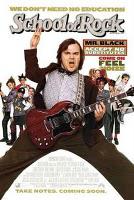 I have a feeling that Bong Joon-ho's Memories of Murder will one day take this slot, but for now I must give it up to Richard Linklater's stupendously grin-creating School of Rock. Starting with a simple premise -- a headbanging loser finding himself in charge of proper, stiff-collared rich kids in need of the loosening powers of rock -- Linklater maximizes every strength of his lead and delights in fighting the repressive yuppie culture that plans children's careers so completely that music is chosen specifically to enhance a child in the womb. But Linklater is not judgmental, and he mainly shows that rock still has the power to move even if it's long-since proven to be safe within a buttoned-down society. It's also that rare movie in which every child actor is interesting and engaging, and it relies as much on their presence as it does Jack Black's manic energy.
I have a feeling that Bong Joon-ho's Memories of Murder will one day take this slot, but for now I must give it up to Richard Linklater's stupendously grin-creating School of Rock. Starting with a simple premise -- a headbanging loser finding himself in charge of proper, stiff-collared rich kids in need of the loosening powers of rock -- Linklater maximizes every strength of his lead and delights in fighting the repressive yuppie culture that plans children's careers so completely that music is chosen specifically to enhance a child in the womb. But Linklater is not judgmental, and he mainly shows that rock still has the power to move even if it's long-since proven to be safe within a buttoned-down society. It's also that rare movie in which every child actor is interesting and engaging, and it relies as much on their presence as it does Jack Black's manic energy.2004 Eternal Sunshine of the Spotless Mind
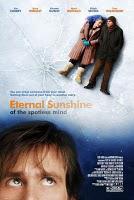 I had a number of choices for this year (this is no longer so clear-cut now that I've seen Claire Denis' The Intruder), but I've got to go with my heart, which remains with this broken couple so devastated by their relationship that they elect to erase it from memory. But Michel Gondry and Charlie Kaufman know that we need the bad to make sense of things, and Joel's fight to keep his painful memories to retain those fragments of delight and self-revelation prove desperately suspenseful for the implications of their loss. I would call it a literalization of the maxim that it's better to have loved and lost than never loved at all, but the film's beauty comes from being anything but literal.
I had a number of choices for this year (this is no longer so clear-cut now that I've seen Claire Denis' The Intruder), but I've got to go with my heart, which remains with this broken couple so devastated by their relationship that they elect to erase it from memory. But Michel Gondry and Charlie Kaufman know that we need the bad to make sense of things, and Joel's fight to keep his painful memories to retain those fragments of delight and self-revelation prove desperately suspenseful for the implications of their loss. I would call it a literalization of the maxim that it's better to have loved and lost than never loved at all, but the film's beauty comes from being anything but literal.2005 The World
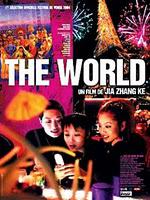 Jia Zhang-ke's microcosmic view of China's continuous slip into megacapitalism lacks the more complete historical triumph of his 2000 feature Platform but makes up for it with its gorgeous staging and symbolic commentary on areas outside China. Vaguely reminiscent of Jacques Tati's Playtime, The World inverts Tati's commentary by showing how society moved to cover up its increasing conformity and modernity by cheaply appropriating old cultural landmarks instead of truly valuing their uniqueness. Jia presents a world so culturally and technologically confused that spoken conversations are terse and businesslike while a text message serves as the inspiration for fantastical reveries.
Jia Zhang-ke's microcosmic view of China's continuous slip into megacapitalism lacks the more complete historical triumph of his 2000 feature Platform but makes up for it with its gorgeous staging and symbolic commentary on areas outside China. Vaguely reminiscent of Jacques Tati's Playtime, The World inverts Tati's commentary by showing how society moved to cover up its increasing conformity and modernity by cheaply appropriating old cultural landmarks instead of truly valuing their uniqueness. Jia presents a world so culturally and technologically confused that spoken conversations are terse and businesslike while a text message serves as the inspiration for fantastical reveries.2006 Miami Vice
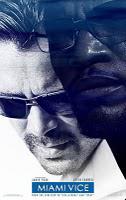 If directors like Apichatpong Weerasethakul and Quentin Tarantino are eulogizing the death of proper, physical film and looking for a way forward, Michael Mann is already laying down the framework for the possibilities of digital cinema. His best work to date is Miami Vice, an existential cop movie that breaks down tropes until he's left with an impressionistic work that conveys only the emotion of the action, never the thrill or "coolness" of it. Unsurprisingly, the film is thus mournful, a collection of ephemeral moments aware of their fated deaths, like moths flying into flame. That shot of a blood-splattered camera turning into the light and obscuring in the reflecting liquid drops dotting the lens sticks with me even now.
If directors like Apichatpong Weerasethakul and Quentin Tarantino are eulogizing the death of proper, physical film and looking for a way forward, Michael Mann is already laying down the framework for the possibilities of digital cinema. His best work to date is Miami Vice, an existential cop movie that breaks down tropes until he's left with an impressionistic work that conveys only the emotion of the action, never the thrill or "coolness" of it. Unsurprisingly, the film is thus mournful, a collection of ephemeral moments aware of their fated deaths, like moths flying into flame. That shot of a blood-splattered camera turning into the light and obscuring in the reflecting liquid drops dotting the lens sticks with me even now.2007 No Country for Old Men
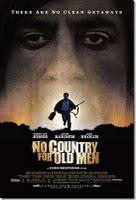 Not simply a great adaptation of Cormac McCarthy's book but a better summation of the author's themes (which, frankly, are more elegantly expressed elsewhere). The Coens barely have to tweak their hip cynicism to encapsulate McCarthy's apocalyptic humanism, proving how adept the were with people despite the constant cries of their supposed hatred of their characters. It contains the usual Coen brothers anitclimax, but here the lens pulls back and captures the full scope of their blunt conclusions. Ennis' withering speech to Bell at the end says as much about tut-tutting over violence in the brothers' films as it does the "vanity" of believing one's own forming days to be idyllic and superior to the next generation's. Besides all that, it's also the formal achievement of American filmmaking in the previous decade and a stark but defining showcase for the power of editing over easier routes of audience manipulation (i.e. music cues).
Not simply a great adaptation of Cormac McCarthy's book but a better summation of the author's themes (which, frankly, are more elegantly expressed elsewhere). The Coens barely have to tweak their hip cynicism to encapsulate McCarthy's apocalyptic humanism, proving how adept the were with people despite the constant cries of their supposed hatred of their characters. It contains the usual Coen brothers anitclimax, but here the lens pulls back and captures the full scope of their blunt conclusions. Ennis' withering speech to Bell at the end says as much about tut-tutting over violence in the brothers' films as it does the "vanity" of believing one's own forming days to be idyllic and superior to the next generation's. Besides all that, it's also the formal achievement of American filmmaking in the previous decade and a stark but defining showcase for the power of editing over easier routes of audience manipulation (i.e. music cues).2008 Shirin
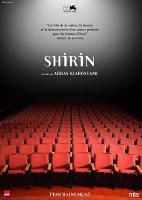 I considered listing Synecdoche New York here, but I'm having doubts about listing Certified Copy as a 2010 film so let's just go with this equally wonderful Kiarostami film that deconstructs the nature of cinema with nothing more than reaction shots. But can they really be called reaction shots when we don't have the action shots for the characters to respond to? Shirin is so simple as to be avant-garde, but as is always the case with Kiarostami, the focus remains with character and humanity. He breaks down Persian art to its essence, then finds how it still connects to modern Iranians and, as can be seen with Juliette Binoche's cameo, those beyond its borders.
I considered listing Synecdoche New York here, but I'm having doubts about listing Certified Copy as a 2010 film so let's just go with this equally wonderful Kiarostami film that deconstructs the nature of cinema with nothing more than reaction shots. But can they really be called reaction shots when we don't have the action shots for the characters to respond to? Shirin is so simple as to be avant-garde, but as is always the case with Kiarostami, the focus remains with character and humanity. He breaks down Persian art to its essence, then finds how it still connects to modern Iranians and, as can be seen with Juliette Binoche's cameo, those beyond its borders.2009 Inglourious Basterds
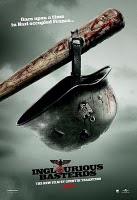 Quentin Tarantino's love letter to cinema doubles as the smartest (and most satiric) deconstruction of the war film since Small Soldiers. Buried beneath the revenge fantasy of killing Hitler are uncomfortable parallels for the "fight terrorism with terrorism" mentality of America's operations in the Middle East and the bloodthirst of Israel's policies (Jews carving swastikas into Nazis a disturbing inversion of SS soldiers slicing Stars of David into rabbis). Tarantino literalizes the power of propaganda at the end by essentially killing Nazis with film, but the inferno of inflammable film stock also proves a Viking funeral for the old way of moviemaking that Tarantino cannot bear to see die. Probably the smartest piece of high-concept mainstream American filmmaking since A.I.
Quentin Tarantino's love letter to cinema doubles as the smartest (and most satiric) deconstruction of the war film since Small Soldiers. Buried beneath the revenge fantasy of killing Hitler are uncomfortable parallels for the "fight terrorism with terrorism" mentality of America's operations in the Middle East and the bloodthirst of Israel's policies (Jews carving swastikas into Nazis a disturbing inversion of SS soldiers slicing Stars of David into rabbis). Tarantino literalizes the power of propaganda at the end by essentially killing Nazis with film, but the inferno of inflammable film stock also proves a Viking funeral for the old way of moviemaking that Tarantino cannot bear to see die. Probably the smartest piece of high-concept mainstream American filmmaking since A.I.2010 The Social Network
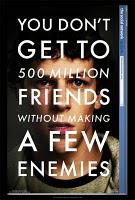 Fincher's Social Network is not his masterpiece (paging Zodiac), but it best demonstrates his remarkable ability to make mainstream entertainment without sacrificing anything. Whatever hardships he endured cutting his teeth on the ill-fated Aliens sequel, Fincher has now proved his capacity for immaculate formalism in crowd-pleasing pictures. Fincher and Sorkin balance each other out, and together they find the core of their insecure protagonist, a middle-class kid who must prove himself against staid institutions and bloodlines but winds up so paranoid about it that he ultimately loses sight of himself in order to prove his worth to the one person who's ever truly be unimpressed by him. In the wake of the economic collapse, seeing the next wave of moguls behaving like the spoiled and arrogant children they are gives some clues as to how the previous generation's problems came about.
Fincher's Social Network is not his masterpiece (paging Zodiac), but it best demonstrates his remarkable ability to make mainstream entertainment without sacrificing anything. Whatever hardships he endured cutting his teeth on the ill-fated Aliens sequel, Fincher has now proved his capacity for immaculate formalism in crowd-pleasing pictures. Fincher and Sorkin balance each other out, and together they find the core of their insecure protagonist, a middle-class kid who must prove himself against staid institutions and bloodlines but winds up so paranoid about it that he ultimately loses sight of himself in order to prove his worth to the one person who's ever truly be unimpressed by him. In the wake of the economic collapse, seeing the next wave of moguls behaving like the spoiled and arrogant children they are gives some clues as to how the previous generation's problems came about.

